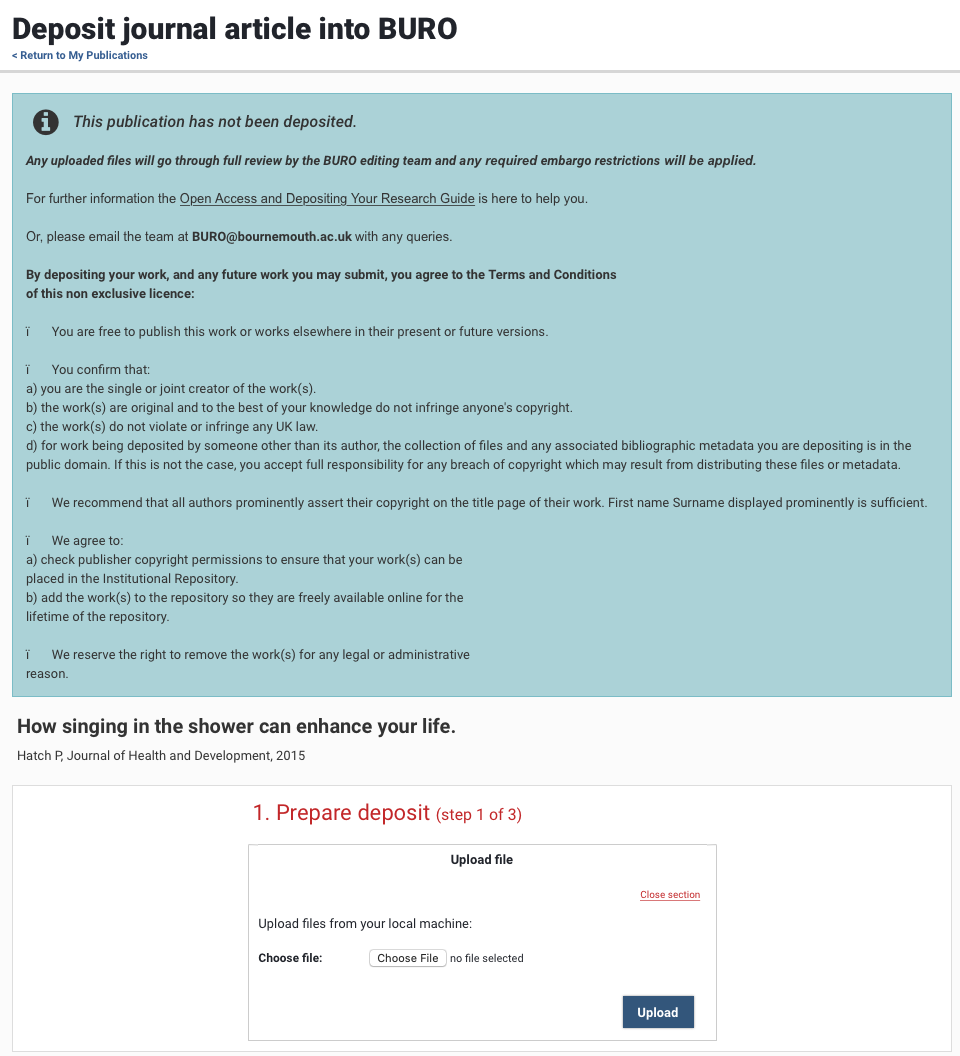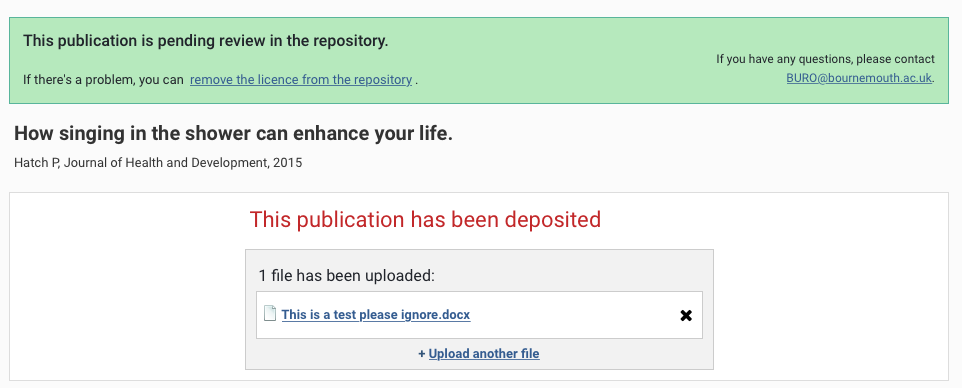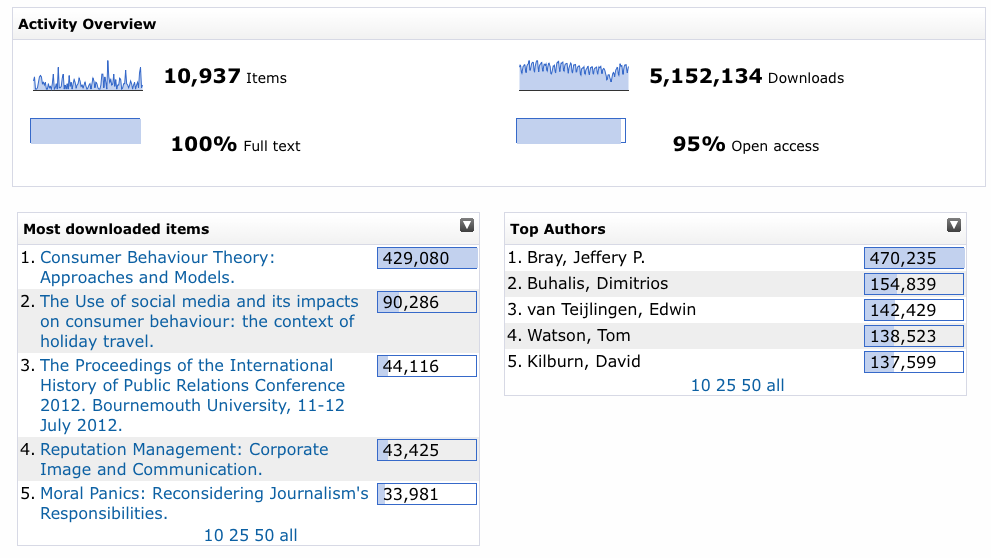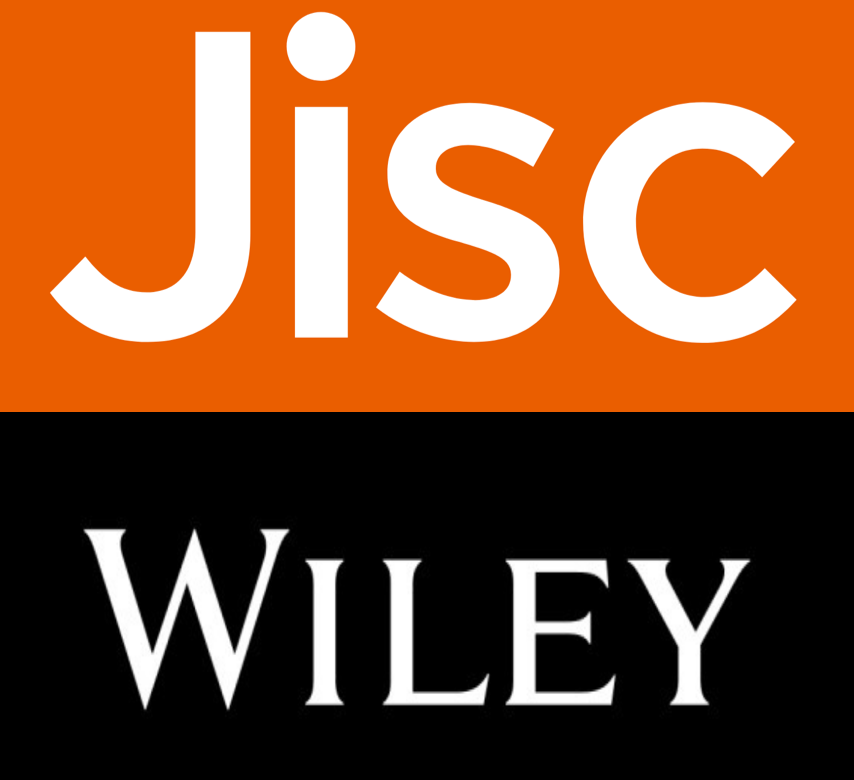
BRIAN (Bournemouth Research Information and Networking)
According to BU’s Publications Policy and Procedures, on acceptance of publication by the publisher, all BU authors should record all research outputs in BRIAN immediately, and no later than three months after this point. For journal articles and conference proceedings, to comply with the REF Open Access policy, all BU authors should ensure that the author-accepted-manuscript (full text) is also deposited in BRIAN at the same time, and no later than three months after this point.
To do so, after you’ve created your publication record, click on the blue arrow up icon to deposit your full text –

You will then be directed to a page where the terms and conditions associated with the deposit will be made clear, before you proceed with choosing your file to be uploaded –

After you’ve uploaded your full text, it will then go through a review process by one of the Bournemouth University Research Online (BURO) team members with the Library and Learning Support Team. This is to ensure first of all, that the correct version of the full text has been uploaded; and depending on the publisher copyright policy, an embargo period may be imposed on the full text before it is visible to the public. If there are any problems with the deposit, one of the BURO teams members will contact the author directly to resolve the issue.

BURO (Bournemouth University Research Online)
Once the full text has been reviewed and processed by the BURO team, it will then be deposited into our institutional repository (IR), which is Bournemouth University Research Online (BURO) and you would have complied with BU’s open access policy. In BURO, you will find all full texts deposited by other BU authors and you can browse the content by year, group or author (surname); and if you’re interested, you can also view the repository statistics in terms of the number of total outputs deposited, their breakdown by type, or you can even check out the most downloaded items from our repository!

BU Staff Profile Page
After your full text has been deposited into BURO, if you have a BU Staff Profile Page, the link to the full text will also appear under your publication record on your Staff Profile Page and it will look like this –

Any visitor to your Staff Profile Page can then click on the link and be directed straight to your full text in BURO read all about your research.
If you have any further queries, please don’t hesitate to email either BRIAN@bournemouth.ac.uk, BURO@bournemouth.ac.uk or OpenAccess@bournemouth.ac.uk











 Last year, we published a
Last year, we published a 
 As published a couple of weeks ago, RDS have worked with Faculty DDRPPs to ensure greater transparency around the recent changes to the bidding approval process, and to ensure that research remains a key activity for our academics.
As published a couple of weeks ago, RDS have worked with Faculty DDRPPs to ensure greater transparency around the recent changes to the bidding approval process, and to ensure that research remains a key activity for our academics.










 REF Code of Practice consultation is open!
REF Code of Practice consultation is open! BU Leads AI-Driven Work Package in EU Horizon SUSHEAS Project
BU Leads AI-Driven Work Package in EU Horizon SUSHEAS Project Evidence Synthesis Centre open at Kathmandu University
Evidence Synthesis Centre open at Kathmandu University Expand Your Impact: Collaboration and Networking Workshops for Researchers
Expand Your Impact: Collaboration and Networking Workshops for Researchers ECR Funding Open Call: Research Culture & Community Grant – Apply now
ECR Funding Open Call: Research Culture & Community Grant – Apply now ECR Funding Open Call: Research Culture & Community Grant – Application Deadline Friday 12 December
ECR Funding Open Call: Research Culture & Community Grant – Application Deadline Friday 12 December MSCA Postdoctoral Fellowships 2025 Call
MSCA Postdoctoral Fellowships 2025 Call ERC Advanced Grant 2025 Webinar
ERC Advanced Grant 2025 Webinar Update on UKRO services
Update on UKRO services European research project exploring use of ‘virtual twins’ to better manage metabolic associated fatty liver disease
European research project exploring use of ‘virtual twins’ to better manage metabolic associated fatty liver disease